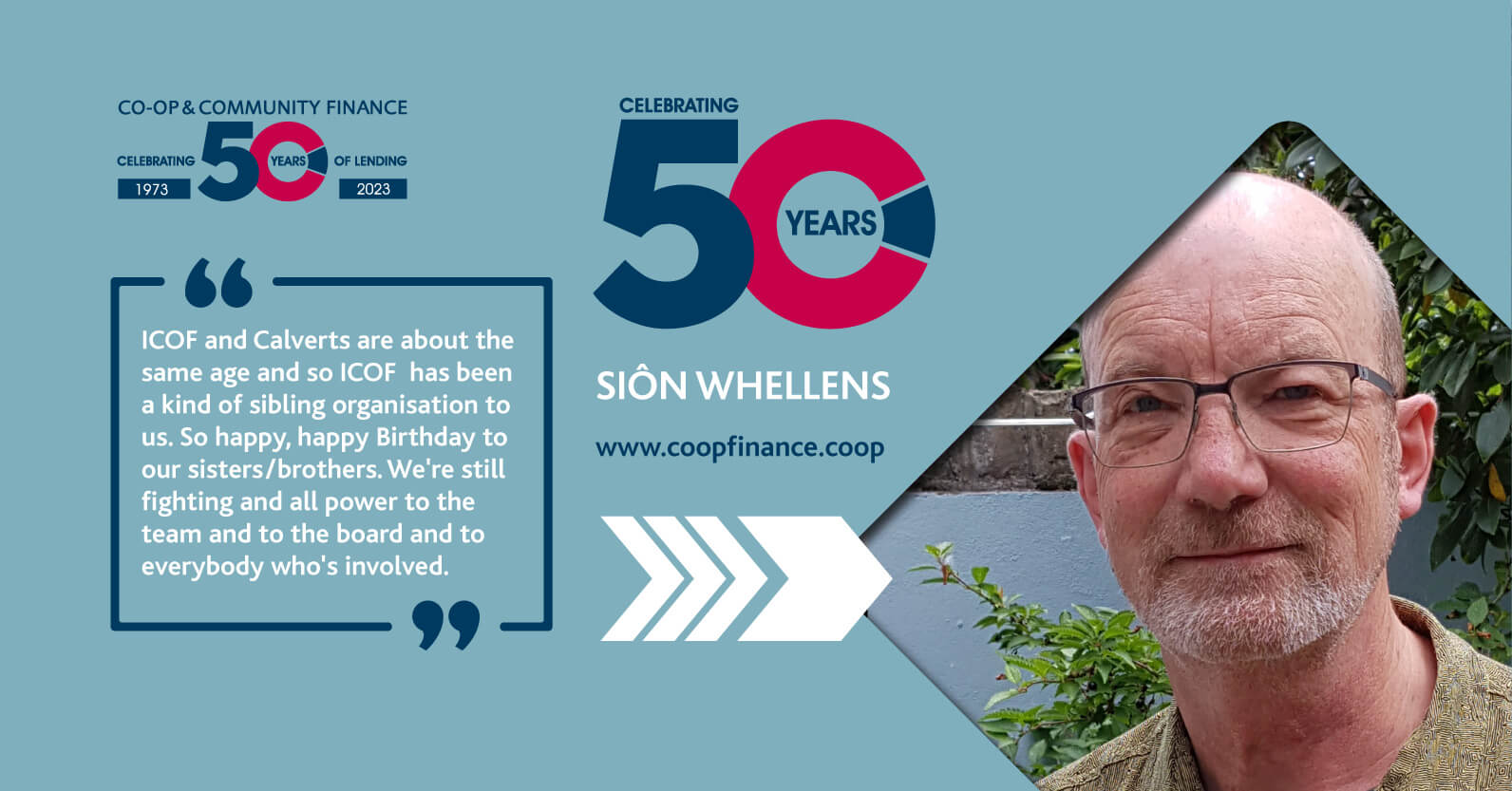Fifty years of friendship and finance – meet Siôn Whellens
Today in our series of interviews with friendships forged over fifty years, we meet worker co-op stalwart Siôn Whellens. Siôn is part of Calverts, Principle Six and the recently formed workers.coop federation.
“I guess the first time I became aware of ICOF was when we had our second loan, back in around 1994/95. We borrowed something like £27,000 to buy some new kit. And then the next time I became aware of it was on a different level. My colleague, Nicola Palmer, served on the board of ICOF for a while. The next time we crossed paths was when I became part of the Worker Co-op Council in 2004. The Worker Co-op Council had a nomination place on the ICOF board. All the time that I was on the Worker Co-op Council, we were putting people forward for the Board which I think carries on now actually with workers.coop. And then at some point in 2012, I put myself forward and was there for a five year term until 2017
Before that loan in the nineties, Calverts had borrowed, a very long time ago, in something like 1977/8. I think they borrowed £500 pounds, more or less, for desktop printing equipment when Calverts set up – well before I was there. That first tiny loan was literally to buy out some small pieces of equipment from the legacy owner when Calvert’s converted the place that they were working into a worker coop. And the rumour is that Calverts was the first co-op to fully repay its loan.
The next loan would have been for reprographic equipment, as in fact is the latest loan. Reprographic equipment is used in an intermediate printing stage, producing film or producing printing plates for printing processes and printing presses. Because the scale of loans that ICOF is able to provide is fairly narrow, we’ve actually borrowed a lot more from capitalist merchant banks than we’ve ever done from ICOF, simply because ICOF couldn’t lend that up to that level of, say, half a million pounds. We’ve always gone to ICOF when we’ve had the opportunity to finance a purchase in the region that ICOF feels comfortable with, and have been glad to access that alternative way of financing.
I think ICOF holds a really special place because it is the only standing financial support institution that explicitly supports worker coops, and that makes it quite unique. I know that it’s broadened its base to include community businesses, democratic social enterprises, and of course it’s been doing a lot of lending to pubs and consumer coops, community shops in country villages and things like that. But it still has that connection for me in my mind back to the days when worker coops were a more recognised thing. I think about ICOF and ICOM as being hand in glove to create an ecosystem for worker coops support and development. Back in those days. And it’s special because it’s a lender, it’s not a grant funder. It’s fairly unique in the current world with that specific connection to the worker coops and these places on its board for worker co-operators.
In one meeting I was really rude and had a terrible cringe afterwards! We were talking again about growth and the size of the fund that ICOF could mobilise – I think it was sort of around £1m and the board had a heated moment and instructed the staff team to get five times bigger, to £5m. Another board member was talking about how it was all fine and we didn’t need to change. It *was* fine for him because he was doing pubs and that level of finance worked there – I got really cross and said I didn’t give a f*ck about pubs! And then I apologised to everybody…
On a lighter note, ICOF usually sponsor the Co-op Futures conference, and they also sometimes get roped into writing a quiz for it, which is always a funny, interesting quiz.
ICOF and Calverts are about the same age and so ICOF has been a kind of sibling organisation to us. So happy, happy Birthday to our sisters/brothers. We’re still fighting and all power to the team and to the board and to everybody who’s involved.”

